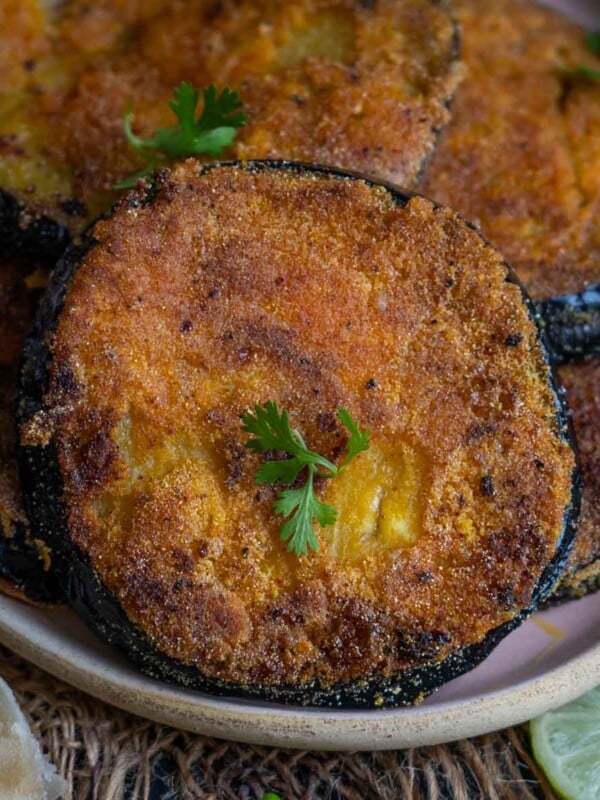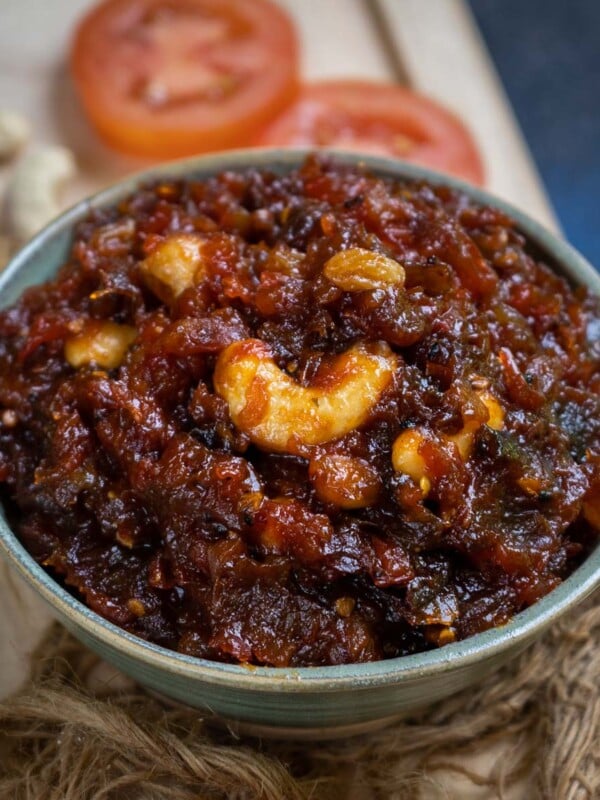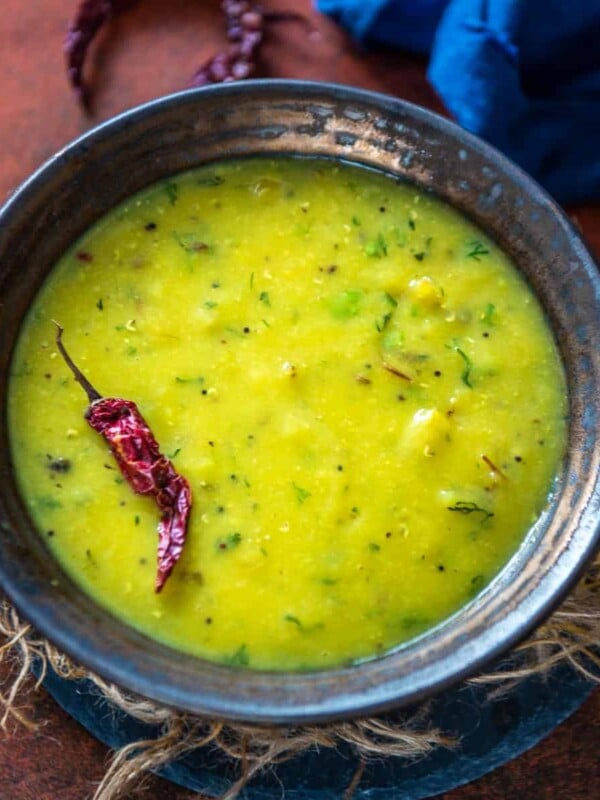Aloo Posto (Bengali Poppy Seed Potato Fry)
on Jan 23, 2025, Updated May 20, 2025
Aloo Posto (Bengali Poppy Seed Potato Fry) is a perfect side dish to enjoy with Luchi or Dal Rice. Use my easy recipe to make this traditional Bengali dish.
Potatoes are everyone’s favorite. Here are a few of my potato recipes that you must try: Aloo Methi Sabzi, Aloo Matar Curry, and Bombay Potatoes.

I have always liked to make new versions of the same vegetable for our meals, and it is one of the very strong reasons why this blog was born. I never liked eating the same thing repeatedly, so I experimented with new variations.
Mohit and I are not big fans of potatoes, but Bhavye ate them as a kid. So I used to make them at least twice a week. I learned to make this Aloo Posto during that time, and now, after all these years, it is still one of our favorite potato recipes.
About Aloo Posto
Aloo Posto (Alu Posto, Poppy Seed Potato Fry) is an authentic Bengali dish in which Aloo means ‘Potatoes’ and Posto means ‘Poppy Seeds.’ It translates to potatoes cooked with poppy seed paste.
It is a very mild dish with flavors of potatoes and poppy seeds shining through.
To make this potato sabji, poppy seeds are ground to a powder or a paste, and potatoes are cooked in this paste along with a few other basic spices.
This popular West Bengali dish is comfort food for many Bengalis. It is best enjoyed with lunch, steamed white rice or roti, and a dal. I like to pair it with crispy parathas.
Aloo Poshto is made for all Bengali festivals, such as Durga Puja and Basant Panchami, and special occasions like weddings and birthdays. It is also a part of every Bengali household’s everyday meals.
This no-onion, no-garlic recipe can also be made for vrat days (Hindu fasting). It is a great dish to pack in office and school lunch boxes.
Making Posto Powder
This is the most tricky part of making alu posto sabji.
Traditionally, white poppy seeds were ground to make a paste using a stone grinder. The paste made using this technique is very fine. But nowadays, not many kitchens have stone grinders, so we have to rely on a spice grinder or coffee grinder to make posto paste.
I have made this recipe multiple times, and the challenge I initially encountered while making this paste was that making poppy seed paste in small quantities is nearly impossible using these modern machines. You HAVE to make a big batch and maybe freeze it for later use.
I also realized that making powder using a grinder is easier than making a paste. The powder can also be stored in the freezer for a longer time. So now, I make my Aloo Posto using poppy seed powder instead of poppy seeds paste, and this trick works perfectly fine. You can try it too!
Ingredients
All the ingredients to make this classic Bengali dish are easily available in any Indian grocery store.
Potato – This recipe’s key ingredient is potatoes. You can use any variety of potatoes that are easily available.
Mustard Oil – Always make this Bengali aloo dish in mustard oil for the traditional flavor. If it’s not available, then you can use any cooking oil.
White Poppy Seeds (Posto, Khus Khus, Posta Dana) are the star ingredient that makes aloo posto recipe different from others.
Others – You will also need nigella seeds (kalonji), dry red chilies, and green chillies.
Some people add turmeric powder to their recipes, but I don’t. Feel free to add it if you wish to.
You can also add Paanch Phoron for tempering instead of only cumin seeds and kalonji.
Make sure the poppy seeds are fresh. If kept for a long time, they will develop a stale smell. I always store them in the refrigerator, significantly increasing their shelf life.
How To Make Aloo Posto
Make Poppy Seeds Powder
Add ½ cup of white poppy seeds to a grinder and grind to make a fine powder.

Measure out 4 tablespoon of powder and freeze the remaining for later use.

Prepare The Potatoes
Peel 1 pound (500 g) of potatoes and cut them into ½-inch cubes.
Cover the cubed potatoes with water; otherwise, they will turn black from oxidation.
Make The Sabzi
Heat 4 tablespoon of mustard oil in a pan over medium-high heat.

Add the following ingredients once the oil is hot, and let them crackle for 3-4 seconds.
- ½ teaspoon cumin seeds
- ½ teaspoon kalonji seeds
- 2 dry red chilies

Drain the water from the cubed potatoes and add them to the pan. Saute for 2-3 minutes.

Now add the following ingredients to the pan along with ½ cup of water and mix well to coat the potatoes with the mixture.
- 4 tablespoon of poppy seeds powder
- 1 teaspoon salt
- 2-3 green chilies (slit into half)


Reduce the heat to low.
Cover the pan with a lid and cook until the potatoes are tender and the raw smell of poppy paste is gone. Stir a few times in between.

Remove the lid and cook uncovered until the sabji is almost dry.
Check for salt and add more if needed.
Serve hot!

Pro Tips By Neha
The poppy seeds turn bitter very soon. Check the best-before date before using them in the recipe; otherwise, they will spoil the taste of the entire dish.
Poppy seeds should be stored in an airtight container in a cool, dry place. They can also be stored in the refrigerator or freezer to extend their shelf life. Avoid storing posto in direct sunlight or a humid environment, as this can cause them to spoil or become rancid.
You can also make a poppy seed paste (posto paste) instead of a powder. Traditionally, a fine paste of these seeds is used to make this dish. But I have switched to the powder version since it is easier to powder them than to make a paste using modern appliances.
Soak 1.8 oz (50 g) of white poppy seeds in ½ cup of hot water for two hours to make a poppy-seed paste. Strain and add them to a grinder jar, along with two green chilies and 3.4 oz (100 ml) water. Grind to make a smooth paste. Use this paste instead of the powder in this aloo posto recipe.
Frequently Asked Questions
You can also make Bengali aloo posto with onion. Fry ½ cup chopped onions in oil until lightly browned. Then add potato cubes and follow the recipe as mentioned below.
You can also add some fried onions at the end of the cooking; it tastes nice.
Storage Suggestions
Alu Posto can be stored in the refrigerator in an airtight container for 3-4 days. Reheat in a pan or microwave until nicely hot before serving.
You Might Also Like

Aloo Posto Recipe (Bengali Poppy Seed Potato Fry)
Ingredients
- ½ cup white poppy seeds powder (posto) (check the instructions for details)
- 1 pound potatoes (500 g)
- 2 tablespoons mustard oil
- ½ teaspoon cumin seeds
- ½ teaspoon nigella seeds (kalonji)
- 2 whole dry red chilies
- 1 teaspoon salt (or to taste)
- 2-3 green chilies (slit into half)
Instructions
Make Poppy Seeds Powder
- Making fine poppy seeds powder or paste in small quantities is not possible using the modern appliances and hence, I grind them in a big batch. I use a little to make the recipe and freeze the remaining powder to use later.
- Add ½ cup of white poppy seeds to a grinder and grind to make a fine powder.
- Measure out 4 tablespoons of powder and freeze the remaining for later use.
Prepare The Potatoes
- Peel the potatoes and cut them into ½-inch cubes.
- Cover the cubed potatoes with water otherwise, they will turn black from oxidation.
Make The Sabzi
- Heat mustard oil in a pan over medium-high heat.
- Once the oil is hot, add cumin seeds, kalonji seeds, and dry red chilies and let them crackle for 3-4 seconds.
- Drain the water from the cubed potatoes and add them to the pan. Saute for 2-3 minutes.
- Now add 4 tablespoons of poppy seeds powder, salt, and green chilies to the pan along with ½ cup of water and mix well to coat the potatoes with the mixture.
- Reduce the heat to low.
- Cover the pan with a lid and cook until the potatoes are tender and the raw smell of poppy paste is gone. Stir a few times in between.
- Remove the lid and cook uncovered until the sabji is almost dry.
- Check for salt and add more if required.
- Serve hot!























This is a genuine question. What makes this dish so popular and loved? I made it for my Bengali husband who as it turned out has never been a fan of alu posto (He must be the exception to prove a rule). But I was excited for my first taste of this much loved Bengali dish. I was disappointed with the result.. A bland potato bhaji with a hint of chilly and a certain oiliness that the posto lends to the dish. But to each his own, I suppose. Will try again till I figure out the ‘Bengali love connection’ 😉 I doubt at the moment if I’ll ever grow to love it…
Some tastes are acquired I guess.
Very nice recipe.But why did you have not used color masala or chilly powder? It will give good color to your recipe.
This recipe is traditionally made like this only. You can add turmeric powder if you want to.